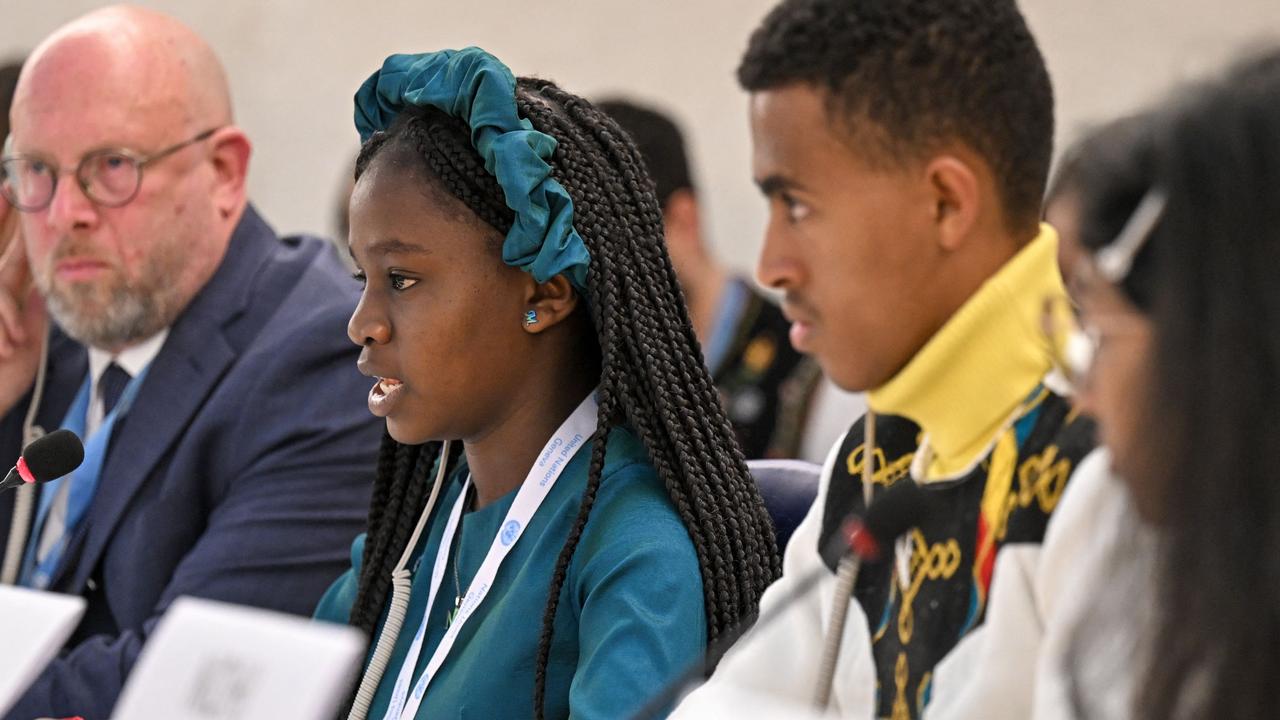Children take the floor at UN to call for safe, digital access
Children from around the world take the floor at United Nations to call for safe, digital access

READING LEVEL: ORANGE
Mariana has made the long journey from the rural* mountains of southern Colombia to the United Nations in Geneva to denounce* digital inequity* and online dangers facing children like her.
“If technology and the internet are part of everyday life for people around the world, why … is this right still not accessible for all children?” the 12-year-old demanded.
Addressing the UN Human Rights Council, she highlighted statistics showing fewer than a third of households in rural Colombia have internet access at home.
Flanked* by children from Ethiopia and Malaysia, as well as United Nations High Commissioner for Human Rights Volker Turk, Mariana was taking part in a UN discussion on child rights in the digital environment.

Marking a first at the UN rights council, a majority of the panellists were minors.
Children also replaced some ambassadors to voice the stance of their countries from the floor, demanding universal* internet access and protection for minors in digital environments.
Mr Turk stressed the importance of hearing from children directly about their insights* into the digital world.
“When I was a child, I could barely have imagined the world you live in today,” he said, pointing to the “instantaneous* connection with others, the knowledge and learning you have at your fingertips.” “We have seen first-hand the promise of technology, but we know that the rapid* rate of progress is not without risk.” Like Mariana, Mr Turk condemned the digital divide which he said meant “a staggering* 2.2 billion children and young people under 25 around the globe still do not have access to the internet at home.” “They are left behind,” he warned, stressing that “it may be time to reinforce* universal access to the internet as a human right*, and not just as a privilege*.”

Mr Turk and the child panellists also voiced alarm at the dangers and pressures that children who can access the internet encounter online.
Nidhi, a 14-year-old podcaster from Malaysia, said that a third of online users worldwide were children but often “they don’t even know how to use online tools safely or preserve* their personal information, which makes them extremely vulnerable*.” The situation is “alarming”, she said, highlighting estimates that 72 million pieces of personal data on average are collected on every child worldwide before they turn 13.

Calling data collection practices “unethical and a violation of children’s online space,” she also slammed how inappropriate content* is often pushed on youngsters.
“I distinctly* remember when I was about nine years old, how scared I was when I saw a scary image while exploring a game on the internet,” she told the council, calling for more safeguards.
Kidus, a 17-year-old from Ethiopia who serves as speaker of the country’s Child parliament, warned that digital technology “poses serious challenges affecting (children’s) wellbeing and rights.”
GLOSSARY
- rural: countryside rather than the town
- denounce: publicly declare to be wrong or evil
- inequality: unfair difference in circumstances
- flanked: surrounded by
- universal: involving all the people in the world
- insights: to gain an accurate and deep understanding of someone or something
- instantaneous: occurring or done instantly
- rapid: quick or sudden growth
- staggering: astonishing, overwhelming
- reinforce: to strengthen or support
- human right: a right which is believed to belong to every person
- privilege: a benefit enjoyed by an individual or group that is not available to others
- preserve: to keep safe from injury, harm, or destruction
- vulnerable: exposed to the possibility of being attacked or harmed, either physically or emotionally
- inappropriate content: material that’s directed at adults but exposed to children
- distinctly: in a way that is easily or clearly heard, seen or felt
- exploitation: the action or fact of treating someone unfairly in order to benefit from their work
EXTRA READING
Protecting life in Earth’s ocean
TikTok sets screen limit on teens
Gen Z girls go all in on influencers
QUICK QUIZ
- Why were the children addressing the UN?
- Where had the children travelled from?
- Roughly, how many children and young adults don’t have access to the internet?
- What did United Nations High Commissioner for Human Rights Volker Turk say about the “digital” world kids live in now?
- What was Nidhi most concerned about?
LISTEN TO THE STORY
CLASSROOM ACTIVITIES
1. Be Convincing!
Do you think that kids should have a permanent role or place in government and organisations like the United Nations? Create a poster. The purpose of your poster is to convince your audience to agree with your opinion on this question.
Time: allow 60 minutes to complete this activity
Curriculum Links: English, History, Civics and Citizenship
2. Extension
Imagine that you have been asked to address the UN Human Rights Council on digital dangers, representing kids in Australia. Plan and write the speech that you would give.
Time: allow 45 minutes to complete this activity
Curriculum Links: English, Personal and Social Capability, Civics and Citizenship
VCOP
Digital Inequity
What does Mariana mean by digital inequity? Do you agree or disagree with her point of view? Could you give reasons to back up your opinions?
Share your opinions with another classmate who shares the same viewpoint on the statement as you.
Together see if you can come up with three strong reasons to support your opinions. Ensure you explain your reasons or provide examples to back them up.
Read over your arguments to clarify them and ensure they are strong viewpoints.
If you were to read them out to the UN Human Rights Council, do you think you would convince them to agree with you? If not, how can you edit them to make them even stronger?

